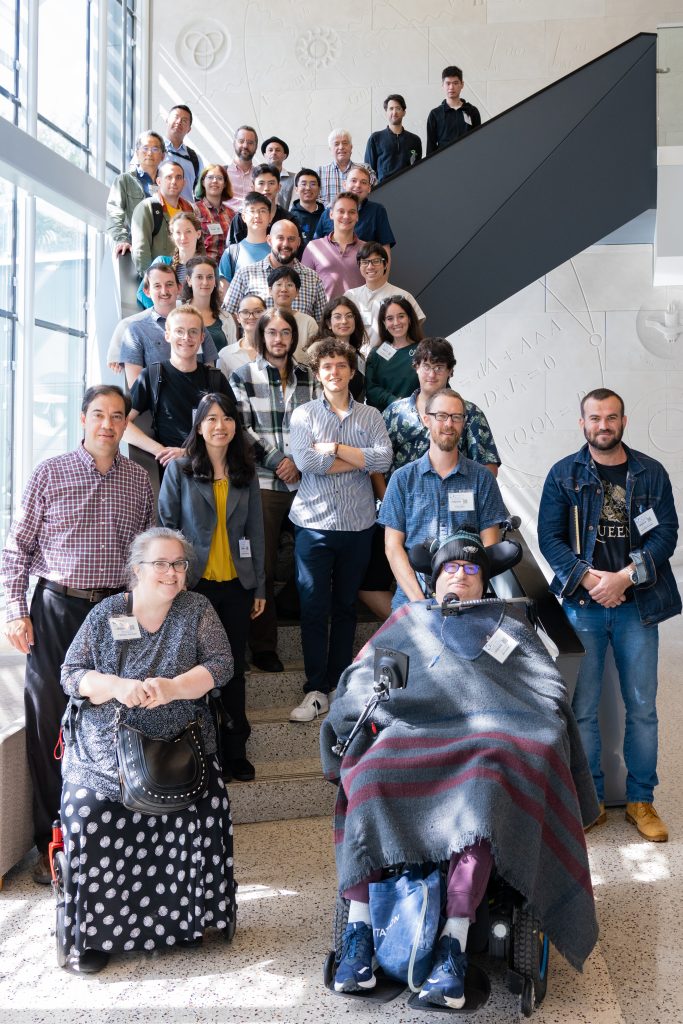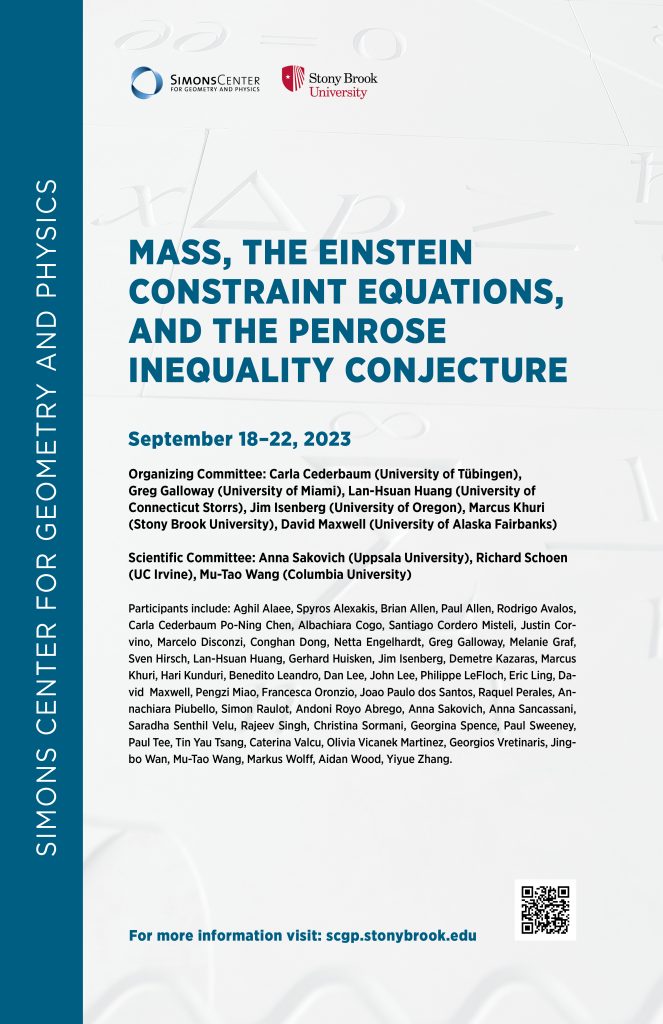Attendee ListScheduleView Videos
Organizing Committee:
• Carla Cederbaum (University of Tübingen)
• Greg Galloway (University of Miami)
• Lan-Hsuan Huang (University of Connecticut Storrs)
• Jim Isenberg (University of Oregon)
• Marcus Khuri (Stony Brook University)
• David Maxwell (University of Alaska Fairbanks)
Scientific Committee:
• Anna Sakovich (Uppsala University)
• Richard Schoen (UC Irvine)
• Mu-Tao Wang (Columbia University)
A major direction of research in Mathematical General Relativity during the last 40 years has been to refine our understanding of the classical positive mass theorem proved by Schoen-Yau and by Witten. In recent years, new proof strategies for this result have been explored and implemented. Moreover, generalizations of the positive mass theorem to dimensions higher than three as well as to other asymptotic models have been studied. Also explored have been the rigidity and the stability of this theorem. Closely related to this work is the recent progress on understanding the continuity and other properties of the ADM mass functional. Similarly, we have seen important progress on the understanding of the Penrose inequality conjecture (which relates the mass of a black hole space-time to the area of the black hole’s horizon). An important tool for this progress is our increasing understanding of the properties of marginally outer trapped surfaces.
Another direction of intense research activity has been to explore and establish theorems for quasi-local notions of mass or energy. These are intimately related to the extension conjectures of Bartnik for which we have also seen significant progress. One goal of this workshop will be to explore connections between these various new branches of research.
At the same time, the construction and parametrization of relativistic initial data sets (which satisfy the Einstein constraint equations) via the conformal method and related tools has seen breakthroughs in various directions. This, as well as other possible approaches for constructing far from constant mean curvature solutions of the Einstein constraint equations, will be explored at this workshop.
Talk Schedule
| Time | Title | Speaker | Location |
| 9:00am | Breakfast | N/A | SCGP Cafe |
| 9:45am | Progress towards the intrinsic flat stability of the Positive Mass Theorem and Penrose Inequality | Christina Sormani | SCGP 102 |
| 11:00am | Squeezing a fixed amount of gravitational energy to arbitrarily small scales, in U(1) symmetry | Spyros Alexakis | SCGP 102 |
| 12:00pm | Lunch | N/A | SCGP Cafe |
| 1:15pm | A quasilocal charged Penrose inequality | Po-Ning Chen | SCGP 102 |
| 2:30pm | On the cosmological constant appearing as an initial condition for nonhomogeneous inflationary models | Eric Ling | SCGP 102 |
| 3:30pm | Tea Time | N/A | SCGP Cafe |
| 4:00pm | Hawking mass monotonicity for initial data sets | Sven Hirsch | SGCP 102 |
| Time | Title | Speaker | Location |
| 9:00am | Breakfast | N/A | SCGP Cafe |
| 9:45am | Criteria for the definition of angular momentum in general relativity | Mu-Tao Wang | SCGP 102 |
| 11:00am | On the stability of Llarull’s Theorem in dimension three | Demetre Kazaras | SCGP 102 |
| 12:00pm | Group Photo | NA | Lobby |
| 12:00pm | Lunch | N/A | SCGP Cafe |
| 1:15pm | Inverse mean curvature flow and 3-manifolds | Gerhard Huisken | SCGP 102 |
| 2:30pm | Rigidity of mass-preserving 1-Lipschitz maps from integral current spaces into Euclidean space | Raquel Perales | SCGP102 |
| 3:30pm | Tea Time | N/A | SCGP Cafe |
| 4:00pm | On manifolds with controlled mass-to-capacity ratio | Pengzi Miao | SCGP 102 |
| Time | Title | Speaker | Location |
| 9:00am | Breakfast | N/A | SCGP Cafe |
| 9:45am | N/A | Netta Engelhardt | ZOOM |
| 11:00am | Existence and uniqueness of toric gravitational instantons | Hari Kunduri | SCGP 102 |
| 12:00pm | Lunch | N/A | SCGP Cafe |
| 1:15pm | On the geometry of electrovacuum spaces in higher dimensions | Benedito Leandro | SCGP 102 |
| 2:30pm | The asymptotically hyperbolic Yamabe problem in the Sobolev setting | Paul Allen | SCGP 102 |
| 3:30pm | Tea Time | N/A | SCGP Cafe |
| 4:00pm | Initial data sets that do not satisfy the Regge–Teitelboim conditions | Melanie Graf | SCGP 102 |
| 6:00pm | Dinner Banquet | N/A | SCGP Cafe |
| Time | Title | Speaker | Location |
| 9:00am | Breakfast | N/A | SCGP Cafe |
| 9:45am | A definition of the mass aspect function for weakly regular asymptotically hyperbolic manifolds | Anna Sakovich | SCGP 102 |
| 11:00am | The equality case of the positive mass theorem | Dan Lee | SCGP 102 |
| 12:00pm | Lunch | N/A | SCGP Cafe |
| 1:15pm | ADM mass and potential theory | Francesca Oronzio | SCGP 102 |
| 2:30pm | A Q-curvature positive energy theorem with applications to rigidity phenomena | Rodrigo Avalos | SCGP 102 |
| 3:30pm | Tea Time | N/A | SCGP Cafe |
| 4:00pm | From free-boundary fluids to the constraint equations | Marcelo Disconzi | SCGP 102 |
| Time | Title | Speaker | Location |
| 9:00am | Breakfast | N/A | SCGP Cafe |
| 9:45am | A new quasi-local mass | Aghil Alaee | SCGP 102 |
| 11:00am | Ricci-Flow on surfaces along the standard light cone in the $3+1$ Minkowski spacetime | Markus Wolff | SCGP 102 |
| 12:00pm | Lunch | N/A | SCGP Cafe |
| 1:15pm | Estimates on the Bartnik mass and their geometric implications. | Annachiara Piubello | SCGP 102 |
| 2:30pm | Maximal Surfaces over exterior domains and approximation of Null Hypersurfaces. | Albachiara Cogo | SCGP 102 |
| 3:30pm | Tea Time | N/A | SCGP Cafe |
| 4:00pm | Solving initial data for Kaluza-Klein spacetimes | Caterina Valcu | SCGP 102/ZOOM |



